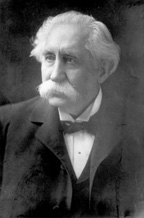William B. Bate
| William Brimage Bate | |
|---|---|
 |
|
| 23rd Governor of Tennessee | |
|
In office January 15, 1883 – January 17, 1887 |
|
| Preceded by | Alvin Hawkins |
| Succeeded by | Robert Love Taylor |
|
United States Senator from Tennessee |
|
|
In office March 4, 1887 – March 9, 1905 |
|
| Preceded by | Washington C. Whitthorne |
| Succeeded by | James B. Frazier |
| Member of the Tennessee House of Representatives | |
|
In office 1849-1851 |
|
| Personal details | |
| Born |
October 7, 1826 Castalian Springs, Tennessee |
| Died | March 9, 1905 (aged 78) Washington, D.C. |
| Resting place |
Mount Olivet Cemetery Nashville, Tennessee |
| Political party | Democratic |
| Spouse(s) | Julia Peete (m. 1856) |
| Profession | Attorney |
| Religion | Baptist |
| Military service | |
| Allegiance |
|
| Service/branch |
|
| Years of service | 1846–1848 (USA) 1861–1865 (CSA) |
| Rank |
|
| Unit | 2nd Tennessee Infantry (USA) |
| Commands | 3rd Tennessee Infantry (CSA) Bate's Bde, Stewart's Div, III Corps AoT Bate's Division, II Corps AoT |
| Battles/wars |
Mexican-American War American Civil War • Aquia Creek (1861) • Bull Run (1861) • Shiloh (1862) • Hoover's Gap (1863) • Chickamauga (1863) • Missionary Ridge (1863) • Resaca (1864) • New Hope Church (1864) • Dallas (1864) • Kennesaw Mountain (1864) • Peachtree Creek (1864) • Atlanta (1864) • Franklin (1864) • Nashville (1864) • Bentonville (1865) |
William Brimage Bate (October 7, 1826 – March 9, 1905) was an American soldier and politician. He served as Governor of Tennessee from 1883 to 1887, and subsequently served as a United States Senator from 1887 until his death. During the Civil War, he fought for the Confederacy, eventually rising to the rank of major general and commanding a division in the Army of Tennessee. Bate saw action in multiple engagements throughout the war, and was seriously wounded on two occasions.
Bate was born in Bledsoe's Lick (now Castalian Springs) in Sumner County, Tennessee, the son of James H. Bate and Amanda Weatherred Bate. He attended a log schoolhouse known as the "Rural Academy." When he was 15, his father died, and he left home to find work. He was eventually hired as a clerk on the steamboat, Saladin, which traveled up and down the Cumberland, Ohio, and Mississippi rivers between Nashville and New Orleans.
While his steamboat was docked in New Orleans, word of the outbreak of the Mexican-American War arrived, and Bate enlisted in a Louisiana regiment. When this enlistment ended a few months later, he reenlisted with the rank of lieutenant in Company I of the 3rd Tennessee Volunteer Infantry. He accompanied General Joseph Lane on several raids in pursuit of Santa Anna toward the end of the war.
...
Wikipedia
